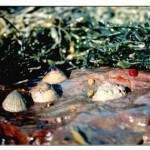Pushkar M. Wadke, Michael T. Burrows, David Meldrum and Andrew J. Davies
Published in the conference proceedings of Oceans 2007, Vancouver (2007)
 Magnetic sensors have existed for many years and are widely used in different applications such as navigation systems, automation, position detection and current detection (amongst others). In this paper we explore a unique application of underwater magnetic sensing using a magneto-resistive sensor to monitor animal behaviour. Animal behaviour researchers have used several different techniques to study the behaviour of limpets. Most common are motographic methods using time-lapse photography. This technique is limited by low resolution, time consuming data analysis and sometimes an obscured field of view. Here, we present preliminary results from the use of a magneto-resistive sensor attached to the common limpet Patella vulgata. The (Honeywell HMC1052) 2-axis anisotropic magneto-resistive (AMR) sensor was fixed using epoxy putty to the shell of a limpet. The sensor has the capability to capture the limpet’s orientation with a resolution of 0.05°. This high resolution allows us to describe a range of behavioural responses which was not possible using earlier techniques. Limpet movement was truthed using time-lapse infra-red videography. Magneto-resistive sensors can quantify orientation behaviour, be used in extreme environments and provide superior data to qualitative and interpreted observations obtained from previous techniques. Several future developments may increase the applicability of this technique, such as using an artificial magnetic field to precisely locate animals at sub-GPS resolution.
Magnetic sensors have existed for many years and are widely used in different applications such as navigation systems, automation, position detection and current detection (amongst others). In this paper we explore a unique application of underwater magnetic sensing using a magneto-resistive sensor to monitor animal behaviour. Animal behaviour researchers have used several different techniques to study the behaviour of limpets. Most common are motographic methods using time-lapse photography. This technique is limited by low resolution, time consuming data analysis and sometimes an obscured field of view. Here, we present preliminary results from the use of a magneto-resistive sensor attached to the common limpet Patella vulgata. The (Honeywell HMC1052) 2-axis anisotropic magneto-resistive (AMR) sensor was fixed using epoxy putty to the shell of a limpet. The sensor has the capability to capture the limpet’s orientation with a resolution of 0.05°. This high resolution allows us to describe a range of behavioural responses which was not possible using earlier techniques. Limpet movement was truthed using time-lapse infra-red videography. Magneto-resistive sensors can quantify orientation behaviour, be used in extreme environments and provide superior data to qualitative and interpreted observations obtained from previous techniques. Several future developments may increase the applicability of this technique, such as using an artificial magnetic field to precisely locate animals at sub-GPS resolution.
Request PDF
| To request a PDF copy of this paper, please enter your email address below: Your email address is not stored, it is only used to send an email with an attached PDF to you. |
Full citation
Wadke, P.M., Burrows, M.T., Meldrum, D. & Davies, A.J. (2007) “Using magneto-resitive sensors to monitor animal behaviour: a case study using limpets” Proceedings, Oceans 2007 MTS/IEEE Vancouver.
